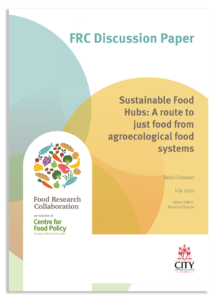Both perpetrator and victim of the climate and biodiversity crises, and producing an abundance of food that is wasted and unfairly distributed, our food system needs to be reimagined in a way that centres both ecological and social justice.
Agroecological farming continues to be promoted as a potential solution, but in order to build an agroecological food system, farming must be accompanied by distribution infrastructure that is appropriate in both scale and values.
Sustainable Food Hubs are well placed to provide such infrastructure: as gatekeepers of values and standards, they select what produce to supply; embedded in their communities, they can respond to local need. Going beyond simply providing short supply chain infrastructure, these hubs can help overcome barriers to establishing more, smaller, agroecological farms, and can integrate projects aimed at overcoming food insecurity and health inequalities. However, it is not easy to juggle the needs of the farmer, the eater, and the countless other people who are impacted by our food system.
This report looks at Sustainable Food Hubs and the fundamental role they could play in transitioning to a just, agroecological food system.


